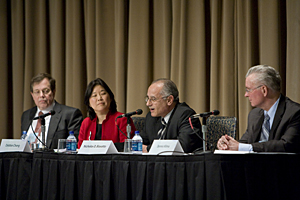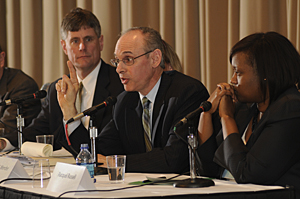

3:58 p.m., March 25, 2009----The University of Delaware's daylong “Stronger Health-Based Partnerships” conference on March 24 featured three afternoon sessions - a presentation by a Congressional health care adviser and two panel discussions - on the future of health care.
A panel discussion titled “Providing High-Quality, Affordable and Accessible Services” was followed by a presentation by Racquel Russell, an adviser on health care in the office of U.S. Sen. Thomas Carper, who spoke on “Future of Health Policy in a Time of Transition.”
Another panel discussion looked at “National and State Innovations: Quality, Costs, Accessibility of Services.”
High quality services
The panel members on providing high quality services were moderator Jeffrey Fried, chief executive officer and president of the Beebe Medical Center; Mark Tykocinski, dean of Jefferson Medical College; Debbie Chang, senior vice president and executive director of Nemours Health and Prevention Services; Nicholas Biasotto, president of Medical Society of Delaware; and Dennis Klima, president and CEO of Bayhealth Medical Center.
Klima spoke of the need to reduce duplication and to increase sharing services to save lives and money, and the need to attract physicians to central and southern Delaware through internships and rotations.
Biasotto discussed primary care as the medical “home” for patients, a model of comprehensive care between the provider and patients in cooperation with community services. He also discussed the need to attract more physicians into primary care.
Health technology is a necessity to health care today, he said, and he discussed the possibility of doctors representing different disciplines forming teams.
Chang talked about chronic conditions, such as obesity and diabetes, which may start in early childhood and are driving the costs of medical care but can be prevented. Nemours is involved in programs linking prevention with clinical care.
She said the policy was to go where the kids are to implement healthy eating and activity through tool kits for childcare providers.
Tykocinsky discussed tertiary and quaternary care and the need for sharing high technology across institutions. Using the term, “coopetition,” he said when medical facilities and physicians team up in many areas, everyone wins. He also discussed the necessity of care being highly integrated with clinical trials and the importance of inter-relationships with industry and biotechnology research.
Healthcare reform
Russell, adviser on health care in Carper's office, said now is the time for healthcare reform. The goals are insuring access, containing costs and improving outcomes and health.
She said the country is at a crossroads in health reform but the “devil is in the details” as Congress and President Barack Obama work on healthcare reform and the “crux is how we pay for it.”
National and state innovations
The last panel discussion dealt with national and state innovations. Moderated by John Taylor Jr., executive director of the Delaware Public Policy Institute, the panel included Tim Gardner, medical director of the Center for Heart and Vascular Health, Christiana Care and president of the American Heart and Stroke Association; Timothy Constantine, chief executive officer of Blue Cross/Blue Shield Delaware; Rita Landgraf, secretary of the Delaware Department of Health and Social Services; Richard C. Wender, chairperson of the Department of Family and Community Medicine, Thomas Jefferson University and past president of the American Cancer Society; and Russell.
Gardner said the rate of death and disability through heart disease and strokes had decreased the past 10 years and the goal of the Heart Association was building healthier years free of stroke and heart disease. He said the stars were aligned for health care reform bringing about healthcare coverage for everyone but that there are many issues and challenges.
Constantine discussed the role of Blue Cross/Blue Shield as the largest insurer in the state and called for changes by encouraging research that works, changing incentives and promoting preventive care and wellness. He discussed public and private efforts to help the working poor throughout the state and grants to health care organizations.
Landgraf included mental health problems among chronic illnesses and said her department protects the most vulnerable population in the state. More Delawareans need help as resources decline, and there are tremendous challenges for the department. There is an increase in those served by Medicaid and that is expected to grow, she said. She also pointed out that Delaware has a rapidly growing aging population.
Wender said health care was a world crisis and spoke on some of the policies involved from healthcare access for everyone to intelligent preventative care. He said there must be a willingness to learn from all perspectives and that everyone involved, including pharmaceutical companies, must be at the table.
Article by Sue Moncure
Photos by Kathy Atkinson, Duane Perry and Evan Krape



